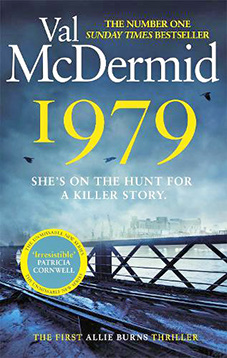
The Weekly paper of the New Communist Party of Britain
Week commencing 29th April 2022

The Weekly paper of the New Communist Party of Britain
Week commencing 29th April 2022

The Weekly paper of the New Communist Party of Britain
1979 by Val McDermid. Little Brown, London. Hardback (2021): 416pp; RRP: £20; Paperback (2022): 464pp; RRP: £8.99; Kindle (2021): 394pp; RRP: £4.99.
VAL MCDERMID’S latest bestseller takes us back to the year of the Winter of Discontent, the first Scottish devolution referendum and what some might consider to be this country’s last Labour Government.

Set around a fictional Scottish newspaper, The Clarion, we return to the pre-internet world of the typewriter, an era long before the internet and mobile phones. In 1979 two budding investigative journalists, Ali Burns and Danny Sullivan, uncover a tax-evasion scheme by the super-rich and attempts by extreme Scottish Nationalists to buy Semtex from the Provisional IRA.
Burns stumbles across the group at a fringe meeting and follows them to an Italian restaurant; whilst Sullivan manages to gain the group’s confidence with relative ease.
Meanwhile the Clarion’s Unionist editor, Angus Carlyle, is keen to run the story as a means of discrediting the pro-independence lobby. The amateurish nature of the group is exposed when their IRA contact laughs at them for keeping money in a bank.
The tax-evasion scheme tells how things have changed since the late 1970s, when the wealthy were forced to hand over sizeable chunks of their ill-gotten gains. Tax-evasion was a laborious not to mention risky affair, involving large amounts of ready cash being transported from one end of Britain to the other. The money would then be used to purchase luxury yachts that would then be sailed to the Caribbean and sold. Today the likes of Google and Amazon simply file tax returns in a draw marked B1N.
The novel shines a light on the fringes of Scottish nationalism and its possible connection with Irish Republicanism, as well as dubious links between crime journalists and corrupt police officers. Journalistic rivalry from the Clarion’s Crime Correspondent, Gordon Beatie, does not bode well for Sullivan.
The book also delves into Glasgow’s Gay underworld at a time when homosexuality was still illegal in Scotland.
Despite a negative remark about the power of the print unions at the time, Val McDermid’s novels are still worth reading. This is her first novel featuring Burns and Sullivan; where journalists rather than police officers are the focus of the story. It has been widely stated that the crime novel exposes capitalism’s failings; McDermid continues to do this well.